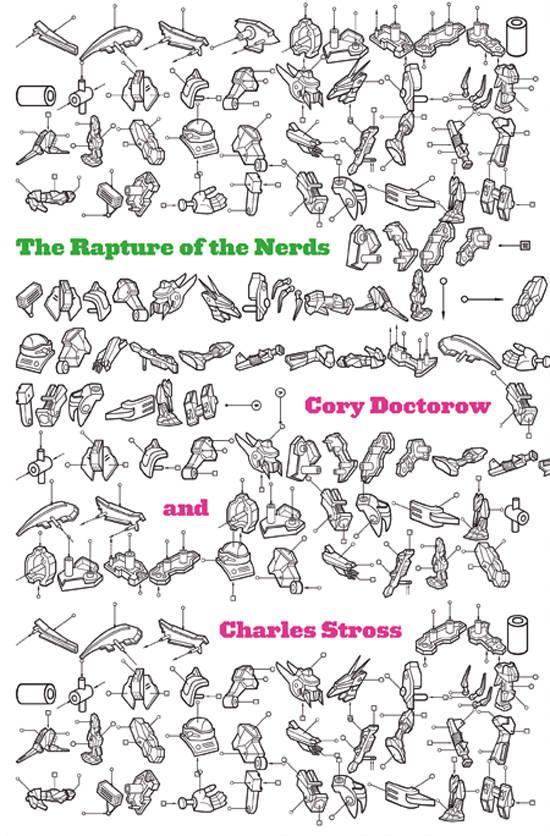by Blogbot
For the best part of a decade Rapture of The Nerds was essentially a two part trilogy, which, like a threesome without a third person, though fun, lacked its defining and completing part. A veritable Crosby and Stills, awaiting a Nash (and with no hope of being joined by a bonus Young), Cory Doctorow and Charles Stross’ jointly-penned post-singularity novellas Jury Service (2002) and Appeals Court (2004) languished, with fans resigning themselves to the fact that they may remain, for all eternity, a duo. But now, thanks in part to a rather random April Fools joke, a third installment of the adventures of an uploaded and rather curmudgeonly consciousness called Huw is about to be unleashed. For many a geek, the completion of the triptych is as miraculous as the father and son being joined by the holy ghost. But since sci-fi fans don’t put much weight in blind faith when it comes to trinities, the good Dr. Doctorow offered up this excerpt to SG by way of empirical proof of the September 4th third coming of Huw. – NP, SG Ed.

THE RAPTURE OF THE NERDS
by Cory Doctorow and Charles Stross
Welcome to the fractured future, at the dusk of the twenty-first century.
Earth has a population of roughly a billion hominids. For the most part, they are happy with their lot, living in a preserve at the bottom of a gravity well. Those who are unhappy have emigrated, joining one or another of the swarming densethinker clades that fog the inner solar system with a dust of molecular machinery so thick that it obscures the sun.
The splintery metaconsciousness of the solar-system has largely sworn off its pre-post-human cousins dirtside, but its minds sometimes wander…and when that happens, it casually spams Earth’s networks with plans for cataclysmically disruptive technologies that emulsify whole industries, cultures, and spiritual systems. A sane species would ignore these get-evolved-quick schemes, but there’s always someone who’ll take a bite from the forbidden apple.
So until the overminds bore of stirring Earth’s anthill, there’s Tech Jury Service: random humans, selected arbitrarily, charged with assessing dozens of new inventions and ruling on whether to let them loose. Young Huw, a technophobic, misanthropic Welshman, has been selected for the latest jury, a task he does his best to perform despite an itchy technovirus, the apathy of the proletariat, and a couple of truly awful moments on bathroom floors…
***
“I hope you enjoy the facilities here,” says the gorilla with a wink. “Nothing but the best for our expert witnesses—we have hot and cold running everything.”
It’s a far cry from jury duty accommodation in a crappy backpacker’s hostel in dusty Tripoli. Huw dials her time right up (sinfully extravagant: it’s the same kind of costly acceleration that got her into trouble when 639,219 called her on it) and orders the whirlpool-equipped hot tub with champagne to appear in the bathroom. Then she climbs in to marinate for subjective hours (a handful of seconds in everyone else’s reference frame) and to unkink for the first time in ages. After all, it’s not as if she’s consuming real resources here. And she needs to relax, recenter her emotions the natural way, and do some serious plotting.
Of course, the sim is far too realistic. A virtual champagne bath should somehow manage to keep the champagne drinking-temp cold while still feeling warm to the touch. And it shouldn’t be sticky and hot and flat; it should feel like champagne does when it hits your tongue—icy and bubbly and fizzy. And when Huw’s nonbladder feels uncomfortably full and relaxed in the hot liquid and she lets a surreptitious stream loose, it should be magicked away, not instantly blended in with the vintage Veuve to make an instant tubworth of piss-mimosa.
This is what comes of having too much compute-time at one’s disposal, Huw seethes. In constraint, there is discipline, the need to choose how much reality you’re going to import and model. Sitting on an Io’s worth of computronium has freed the Galactic Authority—and isn’t that an unimaginative corker of a name? — from having to choose. And with her own self simulated as hot and wide as she can be bothered with, she can feel every unpleasant sensation, each individual sticky bubble, each droplet clinging to her body as she hops out of the tub and into the six-jet steam-shower for a top-to-bottom rinse, and then grabs a towel —every fiber slightly stiff and plasticky, as if fresh out of the wrapper and never properly laundered to relax the fibers—and dries off. She discovers that she is hyperaware, hyperalert, feeling every grain of not-dust in the not-air individually as it collides with her not-skin.
Oh, oh, oh, enough, she wants to shout. What is the point of all this rubbish?
This is the thing that Huw has never wanted to admit: Her primary beef against the singularity has never been existential — it’s aesthetic. The power to be a being of pure thought, the unlimited, unconstrained world of imagination, and we build a world of animated gifs, stupid sight gags, lame van-art avatars, brain-dead “playful” environments, and brain-dead flame wars augmented by animated emoticons that allowed participants to express their hackneyed ad hominems, concern-trollery, and Godwin’s law violations through the media of cartoon animals and oversized animated genitals.
Whether or not sim-Huw is really Huw, whether or not uploading is a kind of death, whether or not posthumanity is immortal or just kidding itself, the single, inviolable fact remains: Human simspace is no more tasteful than the architectural train wreck that the Galactic Authority has erected. The people who live in it have all the aesthetic sense of a senile jackdaw. Huw is prepared to accept — for the sake of argument, mind — that uploading leaves your soul intact, but she is never going give one nanometer on the question of whether uploading leaves your taste intact. If the Turing test measured an AI’s capacity to conduct itself with a sense of real style, all of simspace would be revealed for a machine-sham. Give humanity a truly unlimited field, and it would fill it with Happy Meal toys and holographic, sport-star, collectible trading card game art.
There’s a whole gang of dirtside refuseniks who make this their primary objection to transcendence. They’re severe Bauhaus cosplayers, so immaculately and plainly turned out that they look more like illustrations than humans. Huw’s never felt any affinity for them — too cringeworthy, too like a Southern belle who comes down with the vapors at the sight of a fish knife laid where the dessert fork is meant to go. It always felt unserious to object to a major debate over human evolution with an argument about style.
But Huw appreciates their point, and has spent his and then her entire life complaining instead about the ineffable and undefinable humanness that is lost when someone departs for the cloud. She’s turned her back on her parents, refused to take their calls from beyond the grave, she’s shut herself up in her pottery with only the barest vestige of a social life, remade herself as someone who is both a defender of humanity and a misanthrope. All the while, she’s insisted — mostly to herself, because, as she now sees with glittering clarity, no one else gave a shit — that the source of her concerns all along has been metaphysical.
The reality that stares her in the face now, as she reclines on the impeccably rendered 20-million-count non-Egyptian noncotton nonsheets, is that it’s always been a perfectly normal, absolutely subjective, totally meaningless dispute over color schemes.
Now she’s got existential angst.
<#>
The Burj Khalifa’s in-room TV gets an infinity of channels, evidently cross-wired from the cable feed for Hilbert’s hotel. It uses some evolutionary computing system to generate new programs on the fly, every time you press the channel-up button. This isn’t nearly as banal as Huw imagined it might be when she read about it on the triangular-folded cardboard standup that materialized in her hand as she reached for the remote. That’s because — as the card explained — the Burj has enough computation to model captive versions of Huw at extremely high speed, and to tailor the programming by sharpening its teeth against these instances-in-a-bottle so that every press of the button brings up eye-catching, attention-snaring material: soft-core pornography that involves pottery, mostly.
Huw would like nothing better than to relax with the goggle-box and let her mind be lovingly swaddled in intellectual flannel, but her mind isn’t having any of it. The more broadly parallel she runs, the more meta-cognition she finds herself indulging in, so that even as she lies abed, propped up by a hill of pillows the size of a Celtic burial mound, her thoughts are doing something like this:
• Oh, that’s interesting, never thought of doing that sort of thing with glaze.• Too interesting, if you ask me, it’s not natural, that kind of interesting, they’ve got to be simulating gigaHuws to come up with that sort of realtime optimization.• There’ll be hordes of Huw-instances being subjected to much-less-interesting versions of this program and winking out of existence as soon as they get bored.• Hell, I could be one of those instances, my life dangling on a frayed thread of attention.• Every time I press the channel-up button, I execute thousands — millions? billions? — of copies of myself.• Why don’t I care more about them? It’s insane and profligate cruelty but here’s me blithely pressing channel-up.• Whoa, that’s interesting — she looks awfully like Bonnie, but with a bum that’s a little bit more like that girl I fancied in college.• I could die at any instant, just by losing attention and pressing channel up.• That’s wild, never noticed how those muscles — quadrati lumborum? — spring out when someone’s at the wheel, that bloke’s got QLs for days.• If I were really ethically opposed to this sort of thing, I’d be vomming in my mouth with rage at the thought of all those virtual people springing into existence and being snuffed out.• But I’m not, am I? Hypocrite, liar, poseur, mincing aesthete, that’s me, yeah? • So long as it’s interesting and stylish, I’ll forgive anything.• I’ve got as much existential introspection as a Mario sprite.
Enough, already, she tells herself, and cools herself down to a single thread, then slows that down, hunting for the sweet spot at the junction of stupidity and calm. Then finding it, she settles down and watches TV for a hundred subjective years, slaughtering invisible hordes of herself without a moment’s thought.
Satori.
***
The Rapture of The Nerds excerpt reprinted with the kind permission of Tor Books.
Related Posts:
Cory Doctorow: On Little And Big Brother























